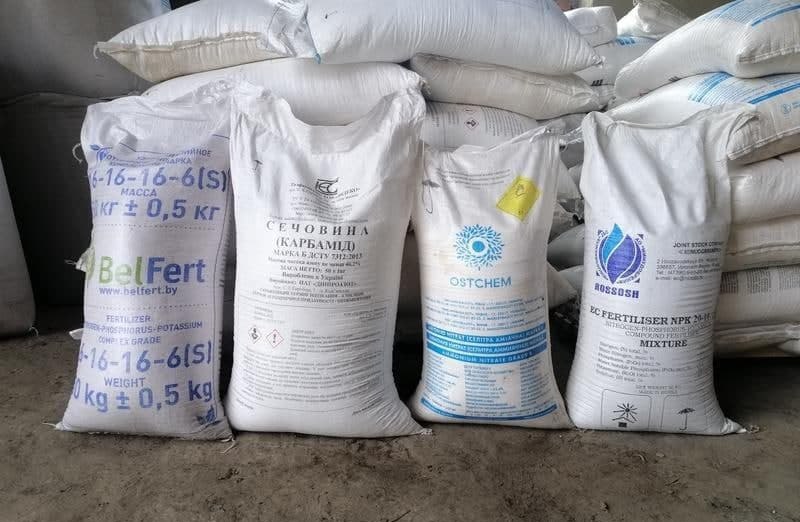Open Joint-Stock Company (OJSC) Azot (Tajikistan’s fertilizer plant – Asia-Plus) is expected to be introduced into operation on the eve of the Navrouz festival, the Minister of Agriculture Qurbon Hakimzoda told reporters in Dushanbe on January 30.
“Mineral fertilizes and fuels are the main components of the cost of agricultural crops,” the minister said.
According to him, Tajikistan last year imported about 200,000 tons of fertilizers that “covers only half of the agriculture’s requirements in mineral fertilizers.”
“Tajikistan needs at least 400,000 of mineral fertilizers annually in order to obtain optimal crop yields,” said the minister. “The only fertilizer plant in the country is expected to be introduced into operation by the Navrouz festival and its first line can produce more than 100 tons of urea and with the launch of the next lines, the plant can bring the volume of output up to 200,000 tons per year.”
“This can greatly reduce the tension in the country’s mineral fertilizer market,” Hakimzoda noted.
The new owner of OJSC Azot is Osiyo Chemical Company and it has reportedly already launched reconstruction at the enterprise and begun preparations for re-introducing it into operation.
Some sources say 200 workers have already returned to the plant and more than 1000 people will work with it after it will be re-introduced into operation.
The debt-ridden and loss-making fertilizer plant has not been in operation since 2008 due to lack of natural gas supplies.
Until 2008, when neighboring Uzbekistan upped the price of natural gas, a key input for the factory, TojikAzot served as a foreign investment-success story for Tajikistan’s economy.
TojikAzot was partly state owned, with the government controlling a 20 percent stake in the troubled enterprise. Ostark Ventures Limited (Ukrainian oligarch Dmitry Firtash is beneficial owner of Ostark Ventures Limited) assumed the 75% ownership interest in the enterprise and Khairullo Saidov, the son of ex-Minister of Industry Zayd Saidov, owned 5 percent of shares in TojikAzot.
On June 24, 2014, the Khatlon Economic Court invalidated the transaction for the sale of TojikAzot.
Tajikistan’s Agency for State Financial Control and Combating Corruption in March 2014 announced an investigation into a 2002 deal between Dmitry Firtash and the Tajik government to create TojikAzot, a plant specializing in the production of urea, an organic compound used in fertilizer. The anticorruption agency accused Firtash of illegal privatization of the company in 2002 and misappropriation of funds.
Firtash was arrested in Vienna on March 12, 2014, and released on a 125 million Euro bail two days later
Following Firtash’s arrest, Tajikistan’s anticorruption agency charged him on March 15 with the illegal privatization of the clothing factory Guliston in 2002.
The anticorruption agency has argued that Zayd Saidov was involved in the fraudulent privatization of Guliston and TojikAzot.
On December 14, 2016, the Majlisi Namoyandagon (Tajikistan’s lower house of parliament) voted for ratification of an investment agreement signed between the Government of Tajikistan and China’s Henan Zhongya Holding Group on September 3, 2016.
Under this agreement, the Chinese company owned 50%+1 shares of the enterprise for the first ten years and then it was supposed to transfer this package of shares to Tajikistan.
Henan Zhongya Holding Group had been committed to invest US$360 million in modernization of coal-powered technological equipment and construction of new shops for production of urea and ammonia in Tajikistan within the next three years. However, the construction works have not been begun.
In August 2019, Tajikistan formally revoked a contract with Henan Zhongya Holding Group, accusing it of failing to fulfill the contract and a full package of shares of OJSC Azot was put out to an investment tender.
The State Committee on Investment and State-owned Property Management (GosKomInvest) said in June 2019 that 350 million U.S. dollars are needed for modernization of this plant. The modernization of the enterprise is expected to increase its annual capacity to 1.6 million tons and the enterprise will be able to export up to 1.3 million tons of mineral fertilizers to the neighboring countries per year.




